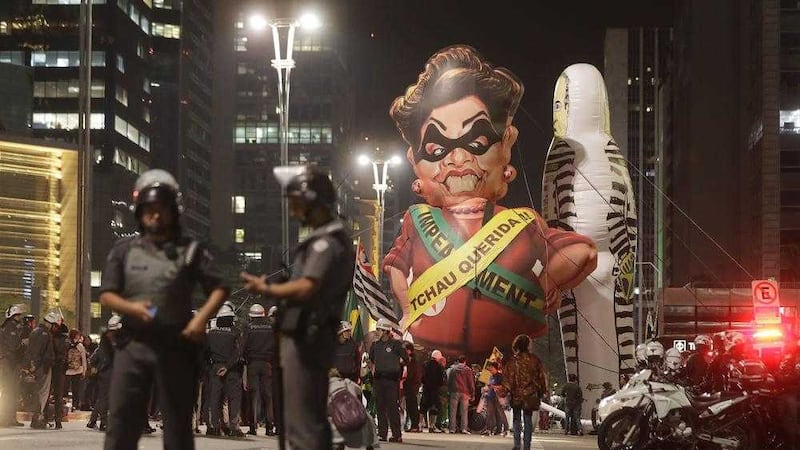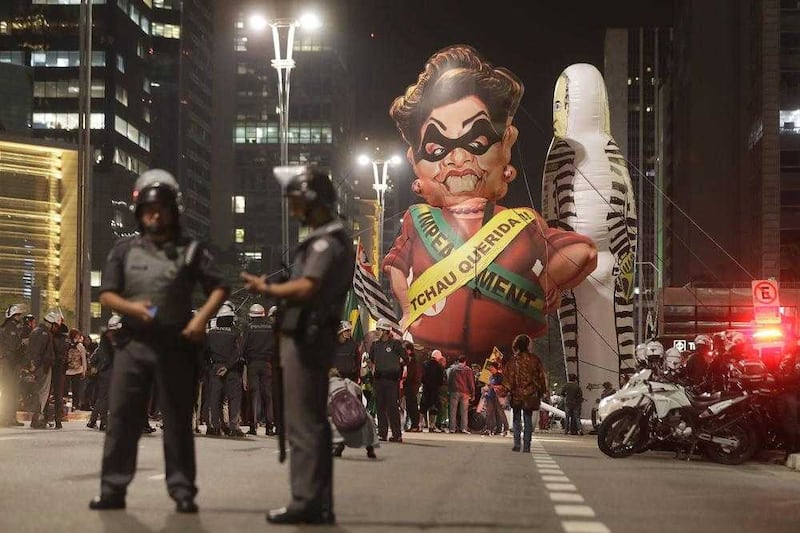MICHEL Temer was sworn in as Brazil's new president after Dilma Rousseff was ousted from office following a year-long fight that has split the nation.
Her allies were vowing to continue to oppose her removal even as Mr Temer, her former vice-president, was promising to revive the economy by capping government spending.
A protest by Rousseff supporters in Sao Paulo turned violent, as they smashed windows of banks and other businesses.
Anti-riot police tried to quell the demonstration with stun grenades and tear gas, and a group of masked protesters threw rocks at a police vehicle and shattered its windows with other objects before they tried to make it roll over.
Brazil's Senate voted on Wednesday to remove Ms Rousseff by 61 votes to 20, after she was accused of breaking fiscal laws in her management of the budget.
Ms Rousseff was Brazil's first female president, with a career that includes a stint as a Marxist guerrilla jailed and tortured in the 1970s during the country's dictatorship.
"The senate has found that the president of the Federal Republic of Brazil, Dilma Vana Rousseff, committed crimes in breaking fiscal laws," chief justice Ricardo Lewandowski, who presided over the trial, said.
Opposition politicians argued that the manoeuvres masked deficits from high spending and ultimately exacerbated Brazil's recession.
Ms Rousseff proclaimed her innocence up to the end, saying that previous presidents used similar accounting techniques.
She said the push to remove her was a bloodless coup by elites fuming over the populist polices of her Workers' Party over the past 13 years.
"Today is the day that 61 men, many of them charged and corrupt, threw 54 million Brazilian votes in the garbage," Ms Rousseff tweeted minutes after the decision.
She won re-election in 2014, gaining more than 54 million votes.
In a second senate vote, Ms Rousseff won a minor victory as a measure to ban her from public office for eight years failed. The 42-36 vote fell short of the 54 votes needed for passage.
In the background of the entire fight was a wide-ranging investigation into billions of dollars in bribes at state oil company Petrobras.
The two-year probe has led to the jailing of dozens of senior businessmen and politicians from across the political spectrum, and threatens many of those who voted to remove Ms Rousseff.
She argued that many opponents just wanted her out of the way so they could save their own skins by tampering with the investigation, which she had refused to do.
Her allies have vowed to appeal to the country's highest court. While previous petitions to the court have failed to stop the impeachment process, the legal wrangling will keep the issue in the spotlight.
Brazilians have already had a taste of Mr Temer's leadership, and they are clearly unimpressed.
In May, he took over as interim president after the senate impeached and suspended Ms Rousseff.
The 75-year-old career politician named a cabinet of all-white men, a decision roundly criticised in a nation that is more than 50 per cent non-white.
Three of his ministers were forced to resign within weeks of taking their jobs because of corruption allegations, which also follow Mr Temer and threaten his hold on power.
When he announced the opening of the Olympics on August 5, he was so loudly booed that he remained out of sight for the remainder of the games.
Several polls have shown that Brazilians want new elections to solve the crisis.
For that to happen, however, Mr Temer would have to be removed from office or resign, something he clearly has no intention of doing.
Speaking to the nation in a televised address, Mr Temer said he had tasked his cabinet with pushing forward budget and pension reforms as well as proposals to create jobs.
"From today on, the expectations are much higher for the government. I hope that in these two years and four months, we do what we have declared - put Brazil back on track," he said.



